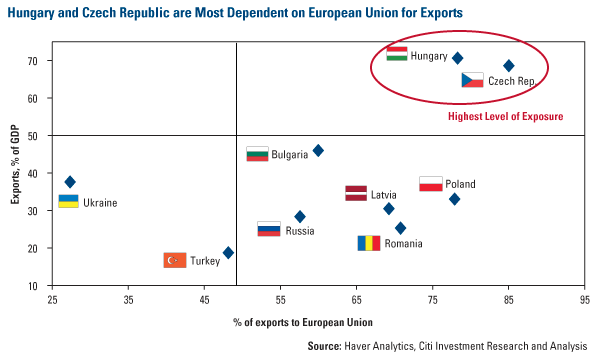This week’s chart from Citigroup looks at Emerging Europe’s exposure to the risks posed by Western Europe’s sovereign debt woes.

The European Union is the primary export market for most of the countries of Emerging Europe, so any weakness in the euro makes their products more expensive for EU residents.
The greatest EU exposure, according to Citi’s research, is faced by the Czech Republic – nearly 70 percent of the nation’s GDP is export-dependent, and about 85 percent of its exports go to the EU. Hungary is nearly in the same position.
Citi points out that this exposure may not be as severe as it appears. Much of the export volume from the Czech Republic and Hungary goes to the EU (particularly Germany) as components for finished products that are then exported. The weaker euro would benefit EU exports, which stands to insulates component suppliers from Emerging Europe to some degree.
At the other extreme in the chart above falls Turkey, whose economy is less reliant on exports than the rest of Emerging Europe, and Ukraine, whose top trade partner is Russia.
Citi also says that Emerging Europe on the whole has little risk of the same sort of public-debt contagion that has the EU ailing and vulnerable. The 2008-09 credit crisis hammered Emerging Europe because of the region’s private-sector debt burdens, not its sovereign debt. A possible exception could be Hungary, whose public debt-to-GDP ratio is close to the EU average.
- Bulenox: Get 45% to 91% OFF ... Use Discount Code: UNO
- Risk Our Money Not Yours | Get 50% to 90% OFF ... Use Discount Code: MMBVBKSM
Disclaimer: This page contains affiliate links. If you choose to make a purchase after clicking a link, we may receive a commission at no additional cost to you. Thank you for your support!


Leave a Reply